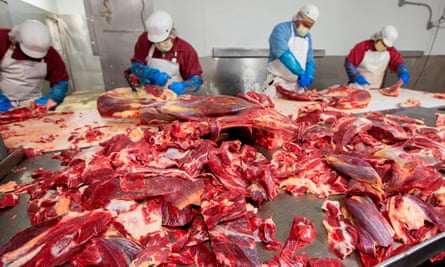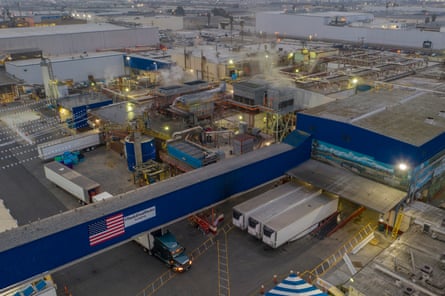The safety of US meat plant workers is at risk, workers and campaigners believe, because of a triple whammy of increased line speeds, higher turnover and fewer workers due to coronavirus.
Authorities, meanwhile, are failing to keep up with the problem. A freedom of information request to the US government shows a dramatic decrease in the number of plant inspectors, while the number of whistleblower complaints has increased by 30% over the past year.
At least 44,530 US meat plant workers have tested positive for Covid since the beginning of the year, and at least 213 have died. But an order put in place by President Donald Trump means plants must remain open.
A number of poultry plants have been allowed to increase their line speeds, despite protests from animal protection groups and workers’ rights organizations such as the National Employment Law Project. In July, United Food and Commercial Workers (UFCW) filed a complaint against the US Department of Agriculture (USDA) over the waiver program.
In late April, the agriculture department’s Food Safety and Inspection Service(FSIS) said that it was no longer accepting line speed waiver requests. However, it has since brought forward a new proposal that could do away with waivers entirely and allow companies to increase line speeds from 140 birds a minute to 175, as long as they meet “certain criteria”.
Meanwhile, between April and July, the FSIS reported a decrease of nearly a 10th of its inspector workforce, according to data obtained through a Freedom of Information Act request. Over the four months, the agency eliminated more than 100 on-line positions and lost a further 198 food inspectors and vets responsible for ensuring meat-processing facilities comply with food safety and animal treatment standards.
Government data on severe injuries, collected by the Occupational Safety and Health Administration (OSHA), is currently only available through April. A recent audit of the agency noted that it did not have enough staff to deal with an increase in worker complaints, and showed a 30% rise in whistleblower complaints from February to May compared to the same period in 2019. It concluded that the agency needed to improve its handling of whistleblowers.

But spokespeople for UFCW and the National Council for Occupational Safety and Health both told the Guardian that they believed injuries had been rising and would continue to, based on what they are hearing from workers.
Tyson, one of the US’s largest meat producers, has come under particular fire, and is currently facing a lawsuit. Workers at Tyson plants, who spoke to the Guardian on condition of anonymity, described the pressure they felt as staffing numbers decreased while speeds rose. “We have double the work because of the lack of workforce on the line,” said a worker at the company’s Berry Street facility in Springdale, Arkansas.
Some plants with outbreaks, like the Berry Street facility – where nearly 250 out of 1,100 employees tested positive in June – have not changed their operations, but rather pushed ahead short-handed, workers said.
The Berry Street worker told the Guardian that, following a mass testing and required quarantine, only about half the 25 people working on her line remained, yet they were still required to help eviscerate the same number of chickens. Supervisors shuffled her around to new departments to fill in for missing workers and she was often pushed to work overtime, requests she was unable to refuse for fear of being penalized.
“I do everything because of the lack of workforce,” the 42-year-old said. “Even though I’m afraid, I have to work. I have to pay bills and rent and everything.”
Another employee at Tyson’s Chick-N-Quick facility in Rogers, Arkansas, described how he narrowly avoided a falling 40-pound box of chicken during a recent shift. A fellow worker on his line recently sliced his hand open with a sharp tool. He puts both instances down to having to cover for sick and missing workers.
“It’s more dangerous because we are fewer people and have to work faster, and by working faster we can’t consider safety,” he said.
A Tyson spokesperson told the Guardian that the company had prioritized the health and safety of its workers, and had “transformed our facilities with a host of safeguards that meet or exceed CDC and OSHA guidance.” A Covid-19 monitoring strategy is now in place, and there are additional occupational health staff, with a new post of chief medical officer created.
The strategy was welcomed by UFCW, while the League of United Latin American Citizens (LULAC) acknowledged that Tyson Foods had “made significant strides.”
The Tyson spokesperson also noted that plants slowed production as staffing levels fell due to the pandemic. “We want to make sure we’re operating in a way that ensures the safety of our team members and the food they’re producing. Hourly team members are involved, using checklists to help determine staffing levels and appropriate line speeds.”
“Like most businesses, we have an attendance policy that encourages people to come to work,” the Tyson spokesperson wrote. “However, we continue to tell our team members to stay home if they have symptoms of Covid or have tested positive for the virus.”
“Shortage of workers and overworking workers? That’s nothing new. It’s an incredibly dangerous job, it’s always been. Is Covid making it worse? Of course,” Amanda Hitt, director of the Food Integrity Campaign at the Government Accountability Project, told the Guardian. “If there are less people doing the job, you’re going to see that workforce driven harder. That’s the math of it.”
Martha Hernandez, a former meat plant worker, said the behavior of regulatory bodies and industry giants during the pandemic was unsurprising. Hernandez, 55, helped found the Arkansas-based workers’ advocacy organization Venceremos. The organization is part of a lawsuit filed in July against Tyson that claims the company is misleading consumers by promoting its commitment “to improving the health and safety [of workers]” in advertisements. Tyson has denied the claim.

Hernandez worked at the Chick-N-Quick in Rogers, mainly grinding birds into mince used to make nuggets, and after several months developed carpal tunnel syndrome in her right hand, a condition that she said required three surgeries. A 2013 report by the Centers for Disease Control and Prevention (CDC) found that 42% of poultry workers who were studied had some evidence of carpal tunnel.
“There are so many injustices there,” she said of the plants. “Sometimes you get really dizzy from how fast the line speed went, but we are not allowed to say, ‘We’re not going to work at this speed.’ They’re not asking you, they’re telling you you have to do it.”
“Production rates in our plants vary and depend on available staffing as well as the type of product being produced,” the Tyson spokesperson wrote. “Our top priority is the health and safety of our team members. That’s why we’ve transformed our facilities with a host of safeguards that meet or exceed CDC and OSHA guidance – from symptom scanning and face masks to workstation dividers and social distance monitors.”
In response to a Washington Post story in April critical of the company’s Covid response, Tyson took out a full-page ad in the paper. In it, board chairman John H Tyson wrote that the company was focused on providing a “safe work environment” during the crisis.
“I am grateful for our team members, but most of all I care about their health and safety,” Tyson stated.
But for Hernandez, who struggles to hold a cup of coffee with her right hand due to her injuries, those words ring hollow.
“They don’t care for us at all,” she said.
Sign up for the Animals farmed monthly update to get a roundup of the best farming and food stories across the world and keep up with our investigations. You can send us your stories and thoughts at animalsfarmed@theguardian.com